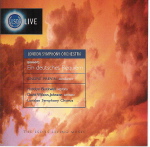André Previn and the London Symphony Orchestra and Chorus have given a long-overdue and invigorating face-lift to this much-recorded work, and in the process have created a rival to Klemperer’s widely admired 1962 standard-bearer. Like Klemperer, Previn takes an up-tempo approach to the seven relatively slow movements and avoids falling into the lugubrious funk exemplified by the recordings of Karajan (EMI and DG) and Celibidache. Actually, Previn’s timings are even faster than Klemperer’s (a saving of nearly five minutes) and he even beats the swift Gardiner disc by a few seconds. Not that speed is the only thing that matters, but a more bracing approach aptly cleaves to the spirit of the work when you consider that, unlike most Requiems (Fauré’s aside) Brahms’ text focuses on faith rather than fear. Musically, the effect conveys a sense of rhythmic vitality and inexorable excitement not normally associated with this work.
Without a doubt, the London Symphony Chorus contributes much to the magic of this live performance at the Barbican Centre in June 2000. At the opening movement “Selig sind, die da Leid tragen”, the chorus intones the breathtaking hushed pianissimo sonority of a small chamber choir, but then really lets loose in the more climactic sections of the second movement (listen to the powerfully resonant recapitulations of “Denn alles Fleisch, es ist wie Gras”). The chorus further demonstrates its exacting ensemble standard in the Vivace section (at measure 82) of the sixth movement. As a bonus, this well-honed chorus pronounces every German word clearly and precisely–even the complex fugato moments in the third and sixth movements are understandable.
Adding to the stunning choral work is superb orchestral playing by the massed London forces. Either through good engineering or careful conducting (or both), orchestral coloring is brought to the fore, increasing the drama and dynamic contrast imbedded in the bulk of this work (check out the accented horns, driving triplets, and huge crescendo in the timpani before the big climax just after rehearsal letter B in the second movement). The trumpets throughout blaze brightly and provide wonderful flair in the fanfare section leading into the Allegro non troppo of the second movement. Similarly, the dissonant outbursts in measures 158 through 168 of the sixth movement (“Hölle, wo is dein Sieg…”) mark those special touches that place this performance among the more truly intense on disc.
The twin soloists, Harolyn Blackwell and David Wilson-Johnson, are themselves studies in contrasts. Wilson-Johnson virtually narrates his solos with a ringing baritone, getting into the meat of the text with the zeal of a cantor, while Blackwell projects a sugary innocent tone. In all, this Requiem stands as one of the best in the catalog and particularly should be heard by any jaded listeners.
































